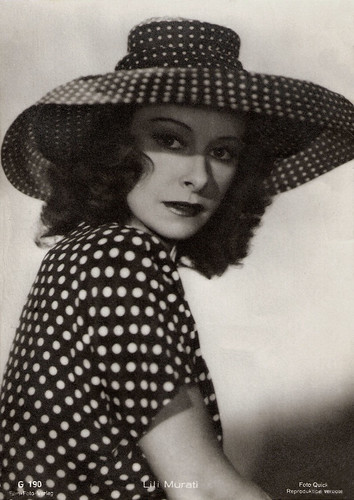
German postcard by Film-Foto-Verlag, no. A 3760/1, 1941-1944. Photo: Star-Foto-Atelier / Tobis.

German postcard by Film-Foto-Verlag, no. G 190, 1941-1944. Photo: Quick.

German postcard by Film-Foto-Verlag, no. G 262, 1941-1944. Photo: T. von Mindszenty.
Miss President
Lili Muráti was born in Nagyvárad, Austria-Hungary (now Oradea, Romania) in 1914.
At 16, she made her stage debut. One of her first film roles was the title role in the romantic comedy A Csunya Lany/A Plain Girl (Béla Gaál, Hermann Kosterlitz - the German director who later became well-known in the USA as Henry Koster, 1935). This film was more or less remade by Marion Davies as Ever Since Eve (Lloyd Bacon, 1937).
Next Lili starred in another romantic comedy, Einok Kisasszony/Miss President (Endre Marton aka Andrew Marton, 1935), as a headstrong girl who inherits the ownership of a textile plant. In both films and also in several later films she starred with Pál Jávor, who was sometimes billed as "the Hungarian Clark Gable".
More popular films followed like the comedy 120-As Tempo/80-Mile Speed (László Kardos, 1937) and the musical farce Fizessen, nagysád!/Pay Up, Madam (Ákos Ráthonyi, 1937). These films made Lili Muráti one of the greatest stars of the Hungarian cinema.
Internationally the Hungarian films did also well, e.g. in 1937, Hungary stood with films in fourth place in America’s film import (after Germany, Great Britain, and France). 18 Hungarian films were shown in theatres in the USA that year.
After the Nazis took over in Austria-Hungary she also worked in German language productions as Was Geschah in Dieser Nacht/What Happened That Night (Theo Lingen, 1941) opposite Irene von Meyendorff.
However, she appeared mainly in Hungarian productions like Házasság/Marriage (1942) with Antal Pagér, Megálmodtalak/I Dreamt You (1943), and Egy nap a világ/A day in the world (1944). These films were all written and directed by her husband Johann von Vásáry, who also wrote the scripts for several other films starring his wife.

Hungarian postcard by Edition Tempo, Budapest, 1942. Photo: Palatinus Filmen. Lili Muráti in Az éjszaka lánya/The Daughtter of the Night (Frigyes Bán, 1943). Music by Karoly De Fries, lyrics by Kalman Kovach. The film deals with a young woman who is made to forget her past, the men, and that she was 'The Girl of the Night'.

Hungarian postcard. Photo: Hunnia Film. Lili Muráti in Házasság/Matrimony (János Vaszary, 1942).

Hungarian postcard by Edition Tempo, Budapest, 1943. Photo: Csiszár and Sárdi / Filmbolt. Lili Muráti and Antal Páger in Csak egy nap a világ/One Day in the World (János Vaszary, 1944). Music by Karoly De Fries, lyrics by János Vaszary.

Hungarian postcard by MFI (Magyar Filmiroda, Budapest), no. 6533. Stamped 24 December 1943.
Urban Legend
After the war, Lili Muráti left Hungary and moved in 1948 to Spain. There she became a popular comedy actress on the Spanish stage.
From 1964 on, she also appeared in film comedies like Playa de Formentor/Beach of Formentor (Germán Lorente, 1964) with Gabriele Tinti, and Escala En Tenerife/Stop in Tenerife (León Klimovsk, 1964).
The next year she became the subject of one of the most famous film urban legends (as retold on IMDb and other sources). Lili played the woman with a baby who tries to jump onto a train in Dr. Zhivago (David Lean, 1965). She fell during the take.
Legend has it that the woman had her legs badly damaged, and even would have amputated her legs in the fall. Director David Lean would have kept the scene in and the filming would have continued. In fact, David Lean biographer Kevin Brownlow discovered that Muráti wasn’t severely hurt and came back several weeks after the accident to do the scene again. Brownlow relied on letters of Muráti when writing his biography of the great director.
The actress continued her film career with supporting parts in Spanish and international productions like Carola de día, Carola de noche/Carola By Day, Carola By Night (Jaime de Armiñán, 1969) starring Marisol, Encrucyada Para Una Monja/A Nun at the Crossroads (Julio Buchs, 1970) with Rosanna Schiaffino, and the erotic Les belles au bois dormantes/Versatile Lovers (Pierre Chenal, 1970) with Marisa Mell.
During the 1970s followed Proceso a Jesús/Jesus’ Process (José Luis Sáenz de Heredia, 1974), and the erotic thriller Die Insel der tausend Freuden/The Island of 1000 Delights (Hubert Frank, 1978) with Olivia Pascal.
In the next decade, her films included the horror-comedy La Momia Nacional/The National Mummy (José Larraz, 1981) and the avant-garde film Diario De Invierno/Winter Diary (Francisco Regueiro, 1988) with Fernando Rey. She also appeared in several Spanish TV series. Her last film appearance was in the Hungarian TV documentary, Mint csúnya lány nagyon helyes voltam (1994), in which she was interviewed about her life and career.
Lili Muráti died in 2003, in Madrid, Spain, at age 88. She was married to writer-director Johann von Vásáry till his death in 1963.

German postcard by Film-Foto-Verlag, no. A 3439/1, 1941-1944. Photo: Star-Foto-Atelier / Tobis.

German postcard by Film-Foto-Verlag, no. A 3559/1, 1941-1944. Photo: Star-Foto-Atelier / Tobis.

German postcard by Film-Foto-Verlag, no. A 3803/1, 1941-1944. Photo: Hunnia Filmgyár. Lili Murati and László Perényi in Házasság/Marriage (János Vaszary, 1942).

German postcard by Film-Foto-Verlag, no. A 3900/1, 1941-1944. Photo: Quick.
Sources: Hal Erickson (AllMovie), Rusty White (Rusty White's Film World), Andrew L. Simon (Made in Hungary: Hungarian contributions to universal culture), El Mundo (Spanish), and IMDb.
This post was last updated on 23 May 2021.
No comments:
Post a Comment